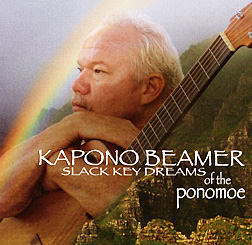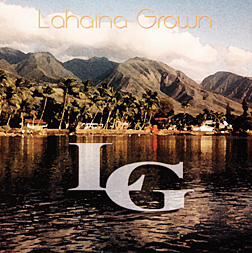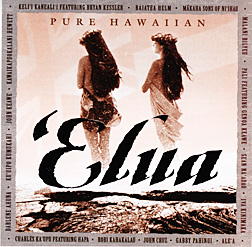
|
Island Mele
|


"Slack Key Dreams
of the Ponomoe"
Kapono Beamer(OnoPak)
It opens with her chanting about an ancestor who died defending the traditional religion of Hawaii against the forces of Kaahumanu during the civil war of 1819. Kapono enhances Dambie's voice with overdubbed nose flute and Hawaiian percussion. He mentions in the liner notes that within 60 years after Kaahumanu broke the kapus, "all the Kamehameha dynasty were dead."
Most of the other songs relate to Kapono's childhood on the Big Island. Most are originals; others have ties to family members. One notable exception is the song that describes a romantic interlude in rainy Nuuanu.
Noel Okimoto (drums, percussion) and Dean Taba (bass) give a slight pop feel to some of the tunes. A beautifully designed booklet adds all the necessary cultural and personal information and completes this Grammy-worthy Hawaiian album.
|


"Lahaina Grown"
Lahaina Grown(Lahaina Grown)
Three songs stand out for their success in delivering well-reasoned political insights within gripping musical performances. "2000" reaffirms the group's commitment to Hawaiian nationalism; a unique blend of Jawaiian and jazz drives a timeless message about the importance of culture. "Plantations" uses more conventional reggae-pop rhythms in recalling the divide-and-conquer tactics of the Territorial Era. "He Iwi" shares a similar outlook, but as laid-back semiacoustic blues.
There are love songs, too: "How Do I Fall" is a dollop of smooth Jawaiian sounds, and "Destiny" expresses the joy of finding that special someone.
It's rare to find a group that plays contemporary local pop or so-called "island music" with this kind of range and imagination.
|


"Pure Hawaiian 'Elua"
Various artists(Quiet Storm)
Get it straight, guys! If you don't share the knowledge, the knowledge will be lost. Many people don't know, for instance, that Malani Bilyeu's "Moloka'i Sweet Home" isn't autobiographical. Far fewer know the history or kaona (hidden meaning) of the older songs.
"Pua Mae 'Ole," newly recorded by Keli'i Kaneali'i of the original HAPA, is the only truly new item (Bilyeu's new recording of "Moloka'i Sweet Home" is a very close copy of his original version). While it's great to have something new from Kaneali'i, unless you want every other song on the album, I suggest you save your money and download these songs -- legally, of course.
|
E-mail to Features Desk
[News] [Business] [Features] [Sports] [Editorial] [Do It Electric!]
[Classified Ads] [Search] [Subscribe] [Info] [Letter to Editor]
[Feedback]

